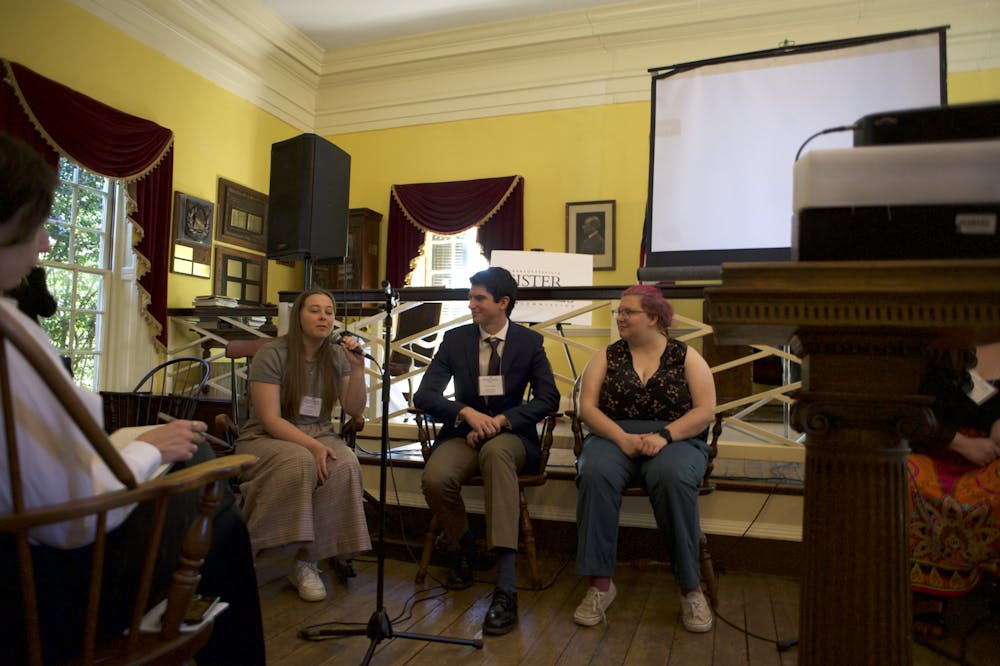Brown College hosted a celebration at Jefferson Hall Monday for the launch of the “Sister Revolutions'' podcast, a four episode narrative on the American and French revolutions in Charlottesville and one of its sister cities, Besançon, France. Attendees at the panel event included representatives from Besançon, University students, University faculty, the Charlottesville Sister City Commission and the podcast’s production team.
The event hosted a three-person delegation from Besançon, including Sadia Gharet, deputy mayor for International Relations for the City of Besançon, and Florent Werguet, head of International Relations for the City of Besançon, both of whom spoke at the beginning of the panel. The third member of the delegation was Sylvie Schmidt, international education partnership coordinator for the Burgundy-Franche-Comte region.
Besançon and Charlottesville signed a sister city agreement in 2006 due to their numerous commonalities, including population size, distance from respective national capitals and the presence of a large university in both cities. The French city is located southeast of Paris and is home to Université de Franche-Comté.
“Sister Revolutions” is a four episode public history documentary podcast exploring the French and American revolutions in both cities, featuring conversations with scholars, public historians and civic institutions. The first three episodes of “Sister Revolutions” will focus on the French Revolution in Besançon, with the final episode covering the city of Charlottesville’s role in the American Revolution. The first episode was released Monday morning, with the next three episodes scheduled to be released each following Monday.
The podcast was co-produced by Benjamin Bernard, a postdoctoral resident faculty fellow at Brown College, and Sage Tanguay, class of 2016 University alumna and multimedia creative producer who oversees Brown College’s community media initiative. Together, the two co-taught an interdisciplinary course this semester titled “Sister Revolutions: Charlottesville and Besançon” open to Brown College residents that focused on the production of the podcast.
Tanguay spoke on the use of a podcast as a medium to convey the stories of the revolutions in the respective cities. She said that podcasts are more accessible to more people and said they have a unique ability to transform listening into an experiential form of media rather than just providing information.
“Podcasting is a way to get information out to a larger group of people than something like an academic article or book,” Tanguay said. “I think it’s a really fun way to tell a story and sort of grab hold of an audience's sense of emotion, sense of timing and sense of heart in order to tell a very vivid story.”
During the panel, Bernard spoke on his takeaways from his work on the podcast as well as the importance of sister city connections more broadly. He said that international diplomacy and sister city connections help bring the national stories of the respective revolutions to a more local audience.
“For me, the sister cities enterprise is really both fascinating and important for preserving these kinds of transnational connections,” Bernard said. “What was amazing about doing this project is finding serendipitous connections that I hadn’t necessarily anticipated.”
Third-year College student Lara Howell, second-year Engineering student Brennen Muller and second-year College student Emily Hemlinger, the three students taking the class who are also listed as assistant producers of the podcast, sat on a five-person panel at the event alongside Bernard and Tanguay. They answered questions about the podcast posed by the moderator, Kirt von Daacke, University assistant Dean and History prof. Hemlinger credited Bernard for the amazing experience for Brown College residents.
“I think [the podcast] is part of the amazing connection we have with our college and to our fellows,” Hemlinger said. “He’s willing to take this funding and this opportunity that he had and give it to us as well.”
Charlottesville has four sister cities total, the other three being Huehuetenango, Guatemala, Poggio a Caiano, Italy and Winneba, Ghana.
Von Daacke said that listening to the podcast is a great opportunity to learn about the purpose of sister cities and to contextualize Charlottesville’s history as part of a broader global story.
“I’ve never known what [having sister cities] means,” von Daacke said. “What I liked about this project was the way it really explained to me why sister cities exist, and how that’s an opportunity to do some cross cultural learning.”
The podcast launch celebration is the second of three events that the delegation attended during their time in Charlottesville. The last event was a sister city community reception to commemorate the 20th anniversary of the signing of the Joint Proclamation of Friendship between Charlottesville and Besançon. The reception took place Tuesday evening and was open to the public.
The podcast can be streamed on numerous platforms through Symposia.







